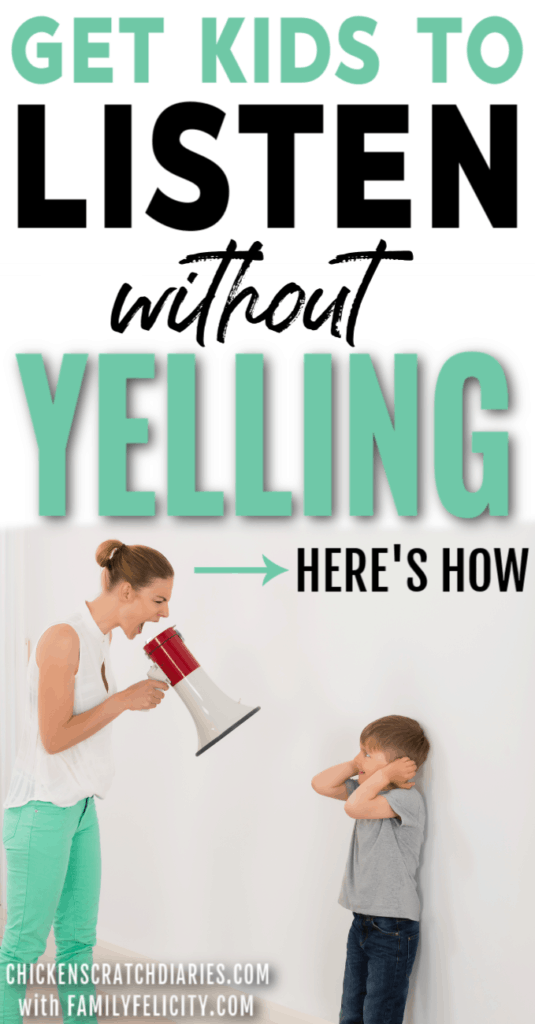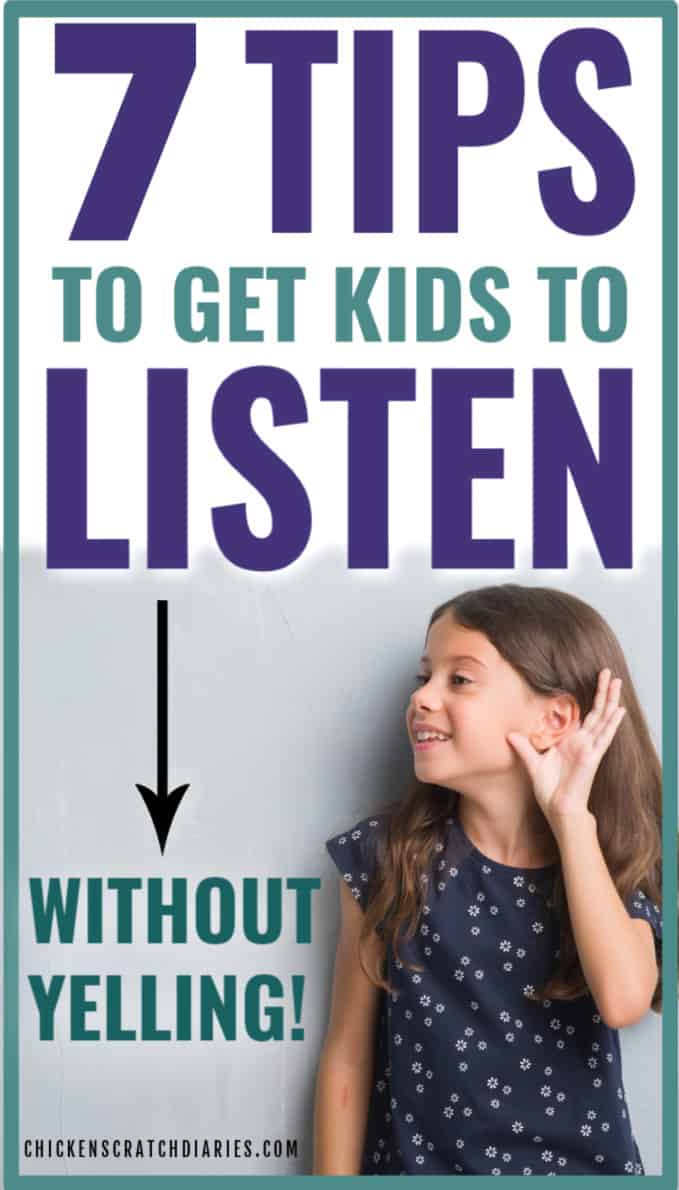Are you at a complete loss for how to get your kids to listen? Tired of the endless cycle of misbehavior and out-of-control yelling? Brandi at Family Felicity is here to provide some actionable steps you can start today – to flip the script and halt the mom-anger in its tracks.
You’re driving down the road headed out for a day with the kids when one of your lovely children is apparently breathing too hard for the liking of her seatmate.
You stay calm, try to ignore it and stay focused on keeping a firm grip on your sanity. While your blood is quietly beginning to boil, the shoving in the back seat ensues.
And when your 3-year-old’s favorite action figure gets knocked from his hands and he starts crying… you let out a terrifying yell that finally quiets the chaos.
This is what I like to call the cycle of madness.
This lovely scenario is one that can easily play out in the car on the way to school, while running errands with the kids, or even right in your living room.
It’s frustrating and, for me, used to lead to countless blowups and fits of yelling at my kids and the paralyzing guilt and shame that would soon follow.
That is, until I finally decided to do something about it.

This post likely contains affiliate links. Please see our disclosure for more info.
With much observation, prayer, and reflection I began to identify why I was yelling at my kids in the first place.
I could also see where I was contributing to the problem and how to end the miserable cycle.
I now have control over my emotions and almost never yell out of anger which is such a free feeling!
Now, I am kind of a loudish person so, I do yell to be heard from time to time. But the angry lash-outs are gone for good.
And let me just say this here really quickly. When I refer to yelling, I’m not talking about yelling upstairs to your kids to hurry up because you’re running late or even a quick yell to stop the fight that just broke out in the playroom.
I’m talking about the yelling that’s rooted in anger and outright mom burnout that sounds more like shouting than yelling. The yelling that leads to paralyzing mom guilt.
There is a way out, so stick with me!
How to Yell-Proof Your Family Life
One of my biggest traps for yelling at my kids was not laying the proper discipline groundwork upfront.
When we miss this step, we fall into the trap of reactive parenting vs. proactive parenting. Let’s just say, reactive parenting isn’t fun for anyone!
Just let me warn you, these are effective tips but not necessarily quick fixes.
When you’re dealing with emotional stuff and habits that have been around for awhile, you need to let change happen over time.
Your kids will break the rules and you will lose it… again. Here’s where grace comes in. You MUST go into any new change with heaps of grace… for you and for your kids.
Read next: 5 Ways to Show Your Kids Grace – When They’re Acting Like the Devil
All it takes is your commitment and time will do the rest.
1 | Set Up The Right Expectations
This one is first for a reason. First of all, you can change, and your kids can change too.
That’s something you need to know and grab hold of throughout any process of changing behavior patterns.
But we need to go a step further and actually expect change to happen. If in the back of our minds, we expect the kids to start fighting and we respond with shouting, that’s likely to be your everyday scenario.
Your expectation can change all that.
Once you put into action the tips in this post, you must set your mind to expect things to change… even if it’s only a little.
Progress is good no matter how small.
This is not merely positive thinking this is both biblical and scientific!
The Bible says, “Surely there is a future [and a reward],
And your hope and expectation will not be cut off.” (source)
In other words, we’ll have what we expect. I believe this scripture is also demonstrated by science with discovery of the self-fulfilling prophecy. Which is basically the concept that whatever we believe strongly about comes to pass largely by our own subconscious efforts.
If you commit to using the tips shared in this post, change will happen overtime but your biggest enemy will be your own negative expectations. It takes courage to believe the best even when we can’t see the best…yet!
Read next: Sibling rivalry: What’s our Role as Christian Parents?
2 | Establish Healthy Boundaries
This step is crucial because it’s laying the foundation for success. We all need boundaries and I find boundaries generally work better than rules when it comes to kids.
Giving a child a list of “don’t do’s” feels less empowering than a perspective of here’s what you can do, with limits.
It’s totally normal and natural for kids to test those boundaries to see what they can get away with.

It’s our job to gently bring them back inside the boundary and offer them natural consequences for their choices.
Some examples of healthy boundaries could be:
“When we go inside the store, we don’t touch anything unless I give you permission first.”
“You can ride your bike to the end of our street and back only.”
“When we get to the park it’s very crowded today, so we will stay together.”
“You can have 30 minutes to play on your tablet and then you can work on your craft project.”
3 | Make Consequences Clear
Once you’ve set up helpful boundaries, get ready for those boundaries to get pushed back.
Again, it’s kind of what they do. We need to see it for what it is – a need for a gentle push back.
It’s not personal or a disrespectful attack on our parenting. Knowing this helps us not go into anger mode.
And the best way to push back is by giving our kids natural consequences. But first, to be fair, we need to make those consequences very clear upfront.
Also, I always make it a point to speak firmly and on their eye level. Talking while we walk or talking down to them is not effective.
If the behavior happens again, I do offer one warning. If they do it a third time, this is where we offer the consequences. Not telling them about the consequences but giving them the consequences.
This is not necessarily a punishment but a real life lesson that teaches our children that there are natural consequences (both good and bad) that are results of our good and poor choices.
Let me give you some natural consequence examples using the boundary scenarios above:
“I asked you not to touch anything unless I gave you permission first. Now, you will go back in the cart / put back that ____, we will not be buying any treats today.”
“Since you decided to ride your bike past our street, you will not be able to ride your bike for one week. This is very dangerous and we want you to understand how to stay safe outside by yourself”
Read next: Are You an Overindulgent Parent? How to Reign it in (and why you must)
4 | Stay Firm Under Pressure
Here’s where things can get a little sticky. We either over-correct and offer a consequence that’s too big or we enter into a bargaining session with our child. Neither are effective.
When establishing boundaries and consequences, think before you speak. Ask yourself, “is this fair and can my child realistically do this?”
This helps increase the chances of our child’s obedience and reduce our chances of going back on our word because we feel guilty for going overboard. The absolutely worst thing we can do is go back on our word!
It’s like blood in the water to a child… no matter their age.
Here’s my simple formula, using the acronym T.O.O.L. to help you remember:
Step 1. Think – set realistic boundaries and consequences upfront.
Step 2. Observe – when you see they’ve gone beyond the boundary, offer one warning.
Step 3. Offer the most natural and appropriate consequence if behavior continues.
Step 4. Locate your resolve and commit to standing firm with your initial boundaries.

5 | Fill Your Bag of Tricks
This step is all about being prepared.
We all know the weak spots that are a breeding ground for meltdowns – for us and the kids!
One of those places is in the car on outings. If your kids are like mine, they likely get a little loopy when in close quarters with their siblings in the backseat.
In that case, remind your kids to bring their favorite book to read, small activity to play, or even their electronics to keep them quiet and focused in the car.
My kids actually enjoy playing Uno in the backseat on the way to school. If things start sounding tense back there, I remind them to whip out their Uno cards.
Food is also a mom’s best friend! Packing plenty of healthy snacks and drinks in a cooler will keep hungry kids from getting hangry and will save you money when they suddenly get hungry when driving by a Chik-Fil-A!
6 | Celebrate the Wins
As a mom, this step is going to be a great asset to you, so don’t skip this one!
So much of our children’s behavior (good or bad) stems from their desire to be seen. Simply put… kids want attention.
So every chance we get, we need to give them positive attention that reinforces all the things they are doing RIGHT. This is huge. We all need affirmation.
When you tell your son to stop kicking the back of your seat and he listens the first time… this calls for a major show of appreciation!
I mean, pull the car over and shoot off the fireworks.
When we show that much attention to what they’re doing right over what they’re doing wrong, which one do you think they’ll do more of?
In short, kids are just tiny humans and we all love praise, a good compliment, and being noticed for doing good. Our kids are no different.
7 | Have Fun
Sometimes in all the preparing and managing your life as a busy mom, it’s easy to forget one thing… having fun.
How does this help you not get frustrated with the kids?
It actually helps a whole lot by lowering your guard. And by you being silly with your kids, your kids are less likely to disrupt all that “easy-goingness” by doing something they shouldn’t.
We need to remember just how much we set the tone for our homes. If we’re always on edge, our kids will be too.
Over the last 13 years of being a mom to 3 children, my biggest goal is connecting with my kids.

Intentional Connection is Key
I can’t build an unbreakable bond with my kids if I’m always uptight and grouchy all the time.
When was the last time you laughed with your kids? If you can’t remember… it’s time to focus on the fun!
When I finally learned to relax and have fun with my kids, I realized this is a priceless gift I’m able to give my kids. And helps me ultimately win the heart of my child, which is my greatest prize as a mom.
Final Thoughts on Yelling
There’s quite a divide on the internet on whether moms yelling at their kids is appropriate or not. Personally, I don’t think it’s that complicated.
We don’t really need someone else telling us when we’ve messed up. We already know it.
The thing is, some moms are louder than others. Many cultures talk and communicate in more of a yell than a speaking voice. And it’s done out of love and not anger. I tend to fall a bit in this category naturally.
However, where things get dicey is when we’re yelling out of anger, shaming our kids, and emotionally dumping on them because of their behavior.
These are all things I’m not proud to admit I’ve done with my kids.
For one, I wasn’t following the steps outlined in this post. And secondly, I had some emotional baggage I carried right into my parenting role that needed to be healed.
If that sounds like you, the steps in this post are a great place to start. And as you see improvement in you and your kids, ask God to help you see where you can better yourself in other areas.
We are all a work in progress and in this life together, so let’s get to work.

Brandi Michel is the founder and head-mama at FamilyFelicity.com. She is a recovering yeller turned pretty-cool mom (according to her teenage daughter). Grab her FREE ebook and learn the simplest tips to better communication and making meaningful connections with your kids today! Come follow her on Pinterest and Instagram!
You might also like:
How to be a Calm Mom (and Banish the Momster)
The Critical Importance of Discipline (why boundaries matter)
How to Raise Responsible (not entitled) Kids
How to Handle “Talking Back”- a Christian Parenting Perspective
20 Ideas for One-on-One Time With your Child (in a large family)
Related Products:

This was short to the point and very helpful.
Thank you Karina! I’m so glad you found the post helpful!
Loved this one! I am a newly minted “teenager” mother. We just turned 13 and I am starting to understand the need for all the teenage parenting resources. This weekend I took a different approach, sort of a time in, if you will. We worked on our servant heart. Instead of grounding her, I had her look for the moments to serve others, it was a way to sort of enjoy our weekend and take out the yelling. Made it a game, to look for ways to serve others in how they needed it most. Your post just solidified my weekend basically, definitely what this mama heart needed to read. Thank you!
This is such a great idea, Rachel. I can only imagine the perspective-shift your approach must have inspired in your daughter.